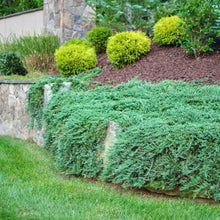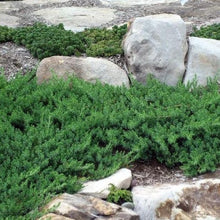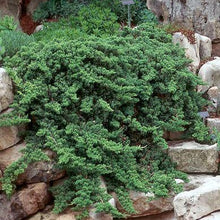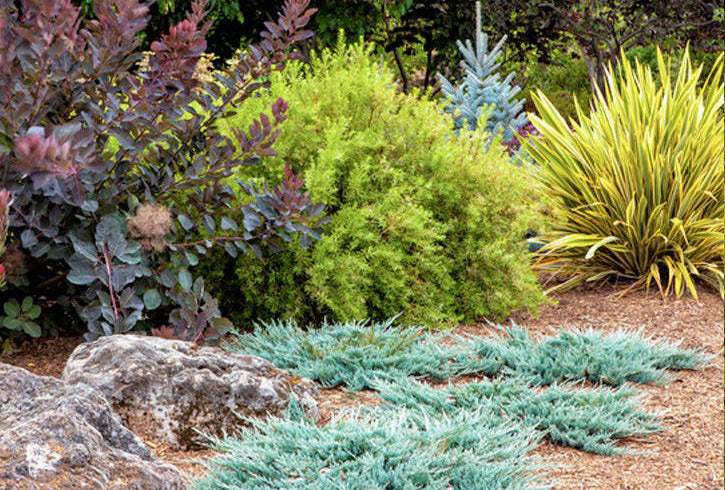
How to Plant Junipers
Dig a hole about twice the width of the root ball and approximately the same depth. Place your plant level in the hole. Be sure the top of the root ball is a bit higher than the soil line and backfill with the soil you removed. Water deeply at the base of the shrub with a hose until the water begins to pool. We recommend mulching your new plant to help the soil retain moisture, reduce competing weeds, and protect the roots. Learn about planting Junipers on Hillsides.
When to Plant Junipers
Junipers can be planted anytime from spring through fall. The southern US and other warm climates can even plant into winter. Spring and summer planting is best for cold climates. This will offer plenty of time for establishment prior to winter.
How to Care for Junipers
Plant Junipers in full to part sun. These tough plants adapt to just about any soil that drains well. After planting water deeply about twice per week for the first couple months. After establishing, junipers are drought tolerant, but a deep watering during periods of extended drought will help your plants grow faster and be healthier. We recommend applying a layer of mulch after planting. Fertilize your plants with a slow release fertilizer in spring.

How to Prune Junipers
Generally these evergreen plants do not require pruning. However, you can remove any dead or broken stems and thin out branches if they become crowded. This allows for good air circulation and sun penetration and helps prevent disease and can even encourage better growth.
When to Prune Junipers
Heavy juniper pruning should be done in late winter or early spring. Minor trimming can be done at any time. Remove sick, broken, or dead branches when you notice them.
How Fast Do Junipers Grow
The growth rate of Junipers varies, but these plants tend to grow at a slow or moderate rate. Most shrub and groundcover junipers grow 4 to 8 inches per year. For creeping or spreading junipers this means growth by width and for other bushes it means height. The Blue Rug can grow up to 12 inches per year. Juniper trees, like the Blue Point, grow about 1 foot per year. Dwarf Juniper trees such as the Dwarf Japanese Garden Juniper Tree, grow slow and stay petite.
Juniper Types
Ground Cover Juniper
These plants are often referred to as Creeping Juniper. They spread out rather than growing tall. Groundcover Junipers are great for controlling erosion, rock gardens, mass planting, and replacing grass in areas difficult to mow.
 Growing Zones 6-8
Growing Zones 6-8 If you are seeking an evergreen groundcover with vibrant color this is the plant for you. Golden yellow foliage covers this bush year-round. In winter the foliage takes on a warm orange-red hue. This creeping juniper is easy to grow and lovely on hills and slopes.
 Growing Zones 5-9
Growing Zones 5-9 The Blue Pacific is a hardy, low maintenance groundcover that is great for preventing soil erosion. The feathery, green foliage transitions to a silvery green in the winter months. This juniper is great for adding texture to almost any landscape.
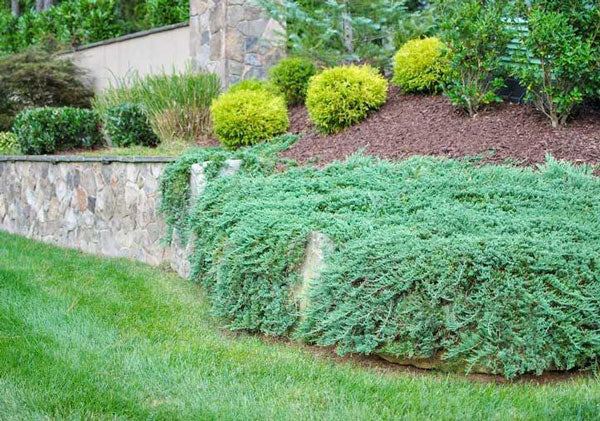 Growing Zones 4-9
Growing Zones 4-9 The fast growing Blue Rug is a gorgeous creeping groundcover. Perfect for those steep hills you’ve had such a hard time growing anything on, this low growing shrub is great for preventing soil erosion. The Blue Rug is extremely disease resistant and low maintenance.
 Growing Zones 5-9
Growing Zones 5-9 The Dwarf Japanese Garden is a compact groundcover juniper that grows in a lovely, cascading fashion that flows outward along the ground, over rocks, or down a wall or container for a stunning, natural look that you just cannot beat. The lush foliage is a vivid green that transitions to hints of blue and purple as temperatures drop. This hardy evergreen is drought and pollution tolerant as well as pest and disease resistant.
Juniper Shrubs
Juniper shrubs are great for group and foundation plantings, low hedges, rock gardens, and mixed beds. This tough bushes offer year-round color and great texture.
 Growing Zones 4-9
Growing Zones 4-9 The icy green-blue color of the Angelica Blue is a great way to make your entire landscape pop! As winter arrives the foliage becomes very blue with a hint of purple. The Angelica Blue will instantly add depth and texture to your landscape with its loose shape and lacy texture.
 Growing Zones 4-8
Growing Zones 4-8 The Blue Star is a hardy dwarf juniper that is perfect for adding color and texture to small spaces. Resistant to disease and drought tolerant, this variety is a great pick! And you can’t beat that icy blue color!
 Growing Zones 4-9
Growing Zones 4-9 Enjoy the ease and versatility of a juniper in a unique and bold golden-yellow color! The Gold Coast really stands out in the landscape. You can't beat the year-round yellow color and the lush, lacy texture it brings to any garden!
 Growing Zones 3-9
Growing Zones 3-9 The soft blue color and whimsical shape of the Grey Owl make is a real treasure in any landscape. These look great in a flowing, curved hedge or sprinkled throughout a bed. This hardy evergreen shrub is pest and disease resistant.
 Growing Zones 4-9
Growing Zones 4-9 The Parsoni Juniper offers a great look in a hardy, easy to maintain shrub. You will love having a groundcover with shrub height! This shrub grows quickly to 2-3 feet tall and about 6 feet wide. The lush foliage is a silvery blue-green that looks great anywhere.
Juniper Trees
These trees are excellent for focal and specimen planting. They look great in groups of 3 or 5 and as a privacy hedge or screen.
Growing Zones 4-9 This upright Juniper offers attractive blue green foliage all year long. It will reach heights up to 12 feet tall and get can get as wide as 6 to 8 feet. This Juniper tree maintains its pyramid form and does not require any pruning. The Blue Point is drought tolerant, easy to grow, and perfect for privacy!

